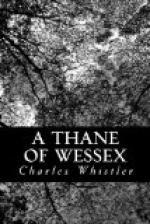Now I had not thought that they would have bided when the beacons were lit; but would have gone out westward with this tide. And therefore I wondered what their next move would be, but expected to see them up anchor and go soon.
Waiting so, I waxed hungry, for nought had I tasted, save a few birds’ eggs that I had found in Holford Coombe, since that time yesterday. Birds’ eggs, thought I, were better than nought, so I wandered among the bushes seeking more. As I did so, by and by, I came in sight of the beacon on the hilltop, and looking up at it, rather blaming my carelessness, saw that but two men were there, tending it, and from their silver collars I knew that they were thralls. They were putting on green bushes to make a smother and black smoke that would warn men that the enemy were yet at hand.
When I saw that both the men were strange to me, I went up to them, as though come to find out news of the business. And they saluted me, evidently not knowing me. I talked with them awhile, and then shared their breakfast with them, glad enough of it. They had, however, no more to tell me than I had already learnt, beyond tales of horror brought by the fugitives of last night, which I will not write.
Those people had soon passed on, fearing, as each new group came up, that the enemy was on their heels. They had doubtless scattered into the villages beyond.
So the time went idly, and the sun rose, while yet the tide fell and the ships lay beneath us. Smoke, as of cooking fires, rose from their decks, and they were evidently in no hurry. Nor need they be. In those days we had no warships such as our wise king has made us since then, and none could harm them on the open water.
In an hour’s time, however, there came a change over the sea. Little waves began to curl over it, and when the sun broke out it flashed bright where the wind came over in flaws here and there. Then from each ship were unfurled great sails, striped in bright colours, and one by one they got under way, and headed over towards the Welsh coast, beyond channel. The tide had turned.
“They are going,” said I, with much gladness.
One of the men shook his head.
“They do but slant across the wind, master. Presently they will go about and so fetch the Wessex shore again, and so on till they reach where they will up channel.”
We watched them, and while we watched, a man came up from the west, heated and tired out, and limping with long running as it seemed. And when he saw me he ran straight to me, and thrusting a splinter of wood into my hand, cried in a panting voice:
“I can no more—In the king’s name to Matelgar of Stert—the levy is at Bridgwater Cross. In all haste.”
It was the war arrow [vi]. No man might refuse to bear that onward. Yet—to Matelgar—and by an outlaw! But the man was beat, and the thralls might not bear it.




